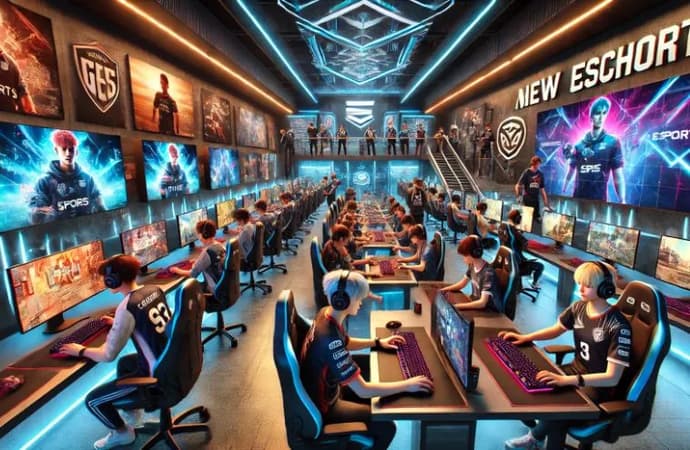
Challenges and Opportunities for E-Gaming Talent Development Programs

The days when gamers could reach the top of esports from home without professional guidance are over. Increasingly, there is attention to nutrition, collaboration, and mental and physical health. Since 2020, several talent development programs for esports have been established. In this article, the program coordinators from the Dutch BrabantSport Esports Talent Hub, H20 Esports Campus, and Esports Talentcenter Gelderland share the five main challenges and opportunities.
1. Lack of a National Esports Pyramid
The biggest challenge for talent development in esports is the lack of a national esports pyramid, according to Matthijs Mol, coordinator of BrabantSport Esports Talent Hub. "In traditional sports, there is a clear sports pyramid, where a player progresses from the bottom to the top. This clear structure is still limited in esports. I think this is a crucial factor for the structural progression of esports players."
Donny Stumpel, coordinator of Esports Talentcenter Gelderland, describes what a pyramid should look like: "At the top, you have top esports, in the middle talent development, and at the bottom grassroots esports. We are in the middle part, talent development, and need to bridge the gap to top esports. Through a school tour, we try to bring grassroots players into the talent development program, but reaching the top is still difficult."
2. Finding Talent
Mol sees finding the right talents as a major challenge: "In esports, the grassroots structure is often invisible because much happens online. This makes it difficult to find esports talent." Currently, teams and talent development centers are often dependent on players who sign up themselves or search within the social circle of already registered players. Players must meet several quality requirements to join the program. Stumpel: "We select players based on four aspects: skill in the game, motivation, age, and location. This means that a portion of the interested players also drops out." Due to the lack of a pyramid and the online culture, identifying esports talent is still challenging for the centers.
3. The Uncertain Career Path of an Esports Player
Even if talent is discovered, the career path for esports players is often uncertain. This also relates to the esports pyramid, says Tuip: "It is often unclear how a player with some experience in smaller tournaments or matches, who climbs the ladder and gets excited, can progress to a semi-professional level." Mol adds: "In esports, you can suddenly belong to the world top and just as quickly disappear.” This might feel like having the same odds as when betting on sport, although it is nothing like it.
A reason for this is the instability of esports games and competition structures. Game owners can decide unilaterally whether to continue funding the competition if popularity declines. This means that an esports player can be out of work from one day to the next and have to switch to another game that requires different skills. Stumpel uses traditional sports to clarify his point: "Compare it to a professional tennis player who suddenly has to play professional padel within a few months."
4. Lack of Social Support for an Esports Career
In addition to uncertainty, coordinators regularly see a lack of social support from the talent's environment, says Stumpel: "Parents and guardians are often unaware of what their child does in esports and how much time is needed for further talent development. The lack of support often occurs with players, which seems to affect their development." Science also sees social support as an important motivator for (sports) talents. Given that talents in other sports spend an average of 28.5 hours per week on their sport, this support seems indispensable.
5. Need for Coaches with Proper Knowledge
For a good training program, good guidance is obviously important. Mol: "Currently, there are few coaches who have both game-specific knowledge of the games and experience or training in coaching." Stumpel explains this: "We are dealing with first-generation, self-taught esports coaches who have enough game experience but often lack the didactic and pedagogical aspect of coaching."

Elen Stelmakh est une personne créative qui se consacre à l'avancement de la culture des jeux vidéo par le biais d'articles et de conceptions visuelles. En tant qu'auteur d'EGamersWorld et concepteur d'un site Web de jeux à temps plein, Elen ne se contente pas de créer du contenu, elle y insuffle également de l'énergie et de la créativité.
 Codes Roblox Anime Guardians février 2026Découvrez tous les codes Roblox Anime Guardians. Échangez-les contre des pièces mystiques gratuites, des relectures de traits, des artefacts et des récompenses.
Codes Roblox Anime Guardians février 2026Découvrez tous les codes Roblox Anime Guardians. Échangez-les contre des pièces mystiques gratuites, des relectures de traits, des artefacts et des récompenses. Casinos en ligne hors Royaume-Uni : Jeux, formats, et ce à quoi les joueurs peuvent s'attendreLes casinos en ligne opérant en dehors du cadre des jeux d'argent du Royaume-Uni attirent l'attention en raison des différences dans les modèles de licence, les portefeuilles de jeux et les...
Casinos en ligne hors Royaume-Uni : Jeux, formats, et ce à quoi les joueurs peuvent s'attendreLes casinos en ligne opérant en dehors du cadre des jeux d'argent du Royaume-Uni attirent l'attention en raison des différences dans les modèles de licence, les portefeuilles de jeux et les... Casinos en bitcoins et plateformes de jeux en cryptomonnaies pour les joueurs britanniquesLes plateformes de jeu basées sur les cryptomonnaies sont devenues un segment important du marché mondial des casinos en ligne.
Casinos en bitcoins et plateformes de jeux en cryptomonnaies pour les joueurs britanniquesLes plateformes de jeu basées sur les cryptomonnaies sont devenues un segment important du marché mondial des casinos en ligne. Les meilleurs casinos internationaux en ligne pour les joueurs britanniquesL'industrie des casinos en ligne est un secteur en pleine expansion, reconnu pour sa technologie, sa vaste bibliothèque de jeux et le montant des revenus qu'elle génère....
Les meilleurs casinos internationaux en ligne pour les joueurs britanniquesL'industrie des casinos en ligne est un secteur en pleine expansion, reconnu pour sa technologie, sa vaste bibliothèque de jeux et le montant des revenus qu'elle génère....


